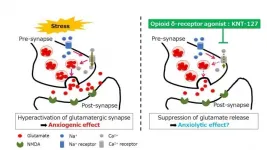'Unexciting' an anxious brain: Novel drug reduces anxiety-like behavior in mice
Researchers make advances in understanding the role of specific glutamate-induced neurotransmission in anxiety-like behavior in mice
2021-06-28
(Press-News.org) Anxiety, commonly termed as a feeling of fear, dread, and restlessness, is a perfectly normal reaction to stressful situations. However, a state of heightened anxiety, which is the reality for thousands of people who struggle to cope with these feelings, is called anxiety disorder. Anxiety disorder can invoke debilitating fear or apprehension, even without any immediate threat. Though intensive research over the years has yielded a plethora of information, and effective drugs like selective serotonin reuptake inhibitors have been used to alleviate this condition, a lot remains to be understood about this complex condition and its treatment.
For a group of Japanese researchers from Tokyo University of Science and University of Tsukuba, endeavoring in this line of research is not new. In a previous study, they used a drug called KNT-127, which acts by activating specific receptors in the brain, called "delta opioid receptors." The researchers found KNT-127 to reduce anxiety-like behavior in mice. They found that KNT-127 caused the reduction of an excitatory neurotransmitter, called glutamate, in the extracellular regions of a part of the brain that controls several emotional states, called the "prelimbic subregion of the medial prefrontal cortex" (PL-PFC). The researchers went on to study this phenomenon in a new study published in Biochemical and Biophysical Research Communications.
According to Professor Akiyoshi Saitoh, from the Faculty of Pharmaceutical Sciences, Tokyo University of Science, and corresponding author of this study, there is a good reason to have investigated the glutamate levels specifically in PL-PFC. He says, "The medial prefrontal cortex (mPFC) plays a vital role in the processing of emotional events. It has been shown that activation of the glutamatergic transmission in PL-PFC evoked anxiety-like behavior in rodents."
Accordingly, Professor Saitoh and his colleagues conducted electrophysiological studies at a single-neuron level in mice. The team measured spontaneous excitatory currents from the glutamate-releasing presynapse region of various important neurons treated with and without KNT-127, in the PL-PFC of mice that had been induced to exhibit anxious behavior.
For neurons treated with KNT-127, the results showed that release of glutamate was reduced at the PL-PFC synapses. Since this excitatory neurotransmitter relays information from one neuron to the other, at the synapse region, the corresponding brain activity was also found to be lowered. Interestingly, the team found that KNT-127 treatment made the PL-PFC neurons less excitable. The researchers considered these findings to be a consequence of the anxiolytic effects of KNT-127.
Overall, this study proposes a novel pathway--and a novel drug candidate--that can be targeted for treating anxiety disorder. Commenting on the clinical potential of drugs like KNT-127, Dr. Daisuke Yamada, one of the investigators in the study from Tokyo University of Science, says, "There is a need for the development of new therapeutic agents that have different mechanisms of action from existing drugs. The results of this study are expected to lead to the development of evidence-based antipsychotics with a new mechanism of action, targeting opioid delta receptors."
Indeed, the world can hope for groundbreaking anxiolytic drugs to enter the market, taking after the results of this promising study!
INFORMATION:
Reference
Title of original paper: Modulation of glutamatergic synaptic transmission and neuronal
excitability in the prelimbic medial prefrontal cortex via delta-opioid receptors in mice
Journal: Biochemical and Biophysical Research Communications
DOI: https://doi.org/10.1016/j.bbrc.2021.05.002
About The Tokyo University of Science
Tokyo University of Science (TUS) is a well-known and respected university, and the largest science-specialized private research university in Japan, with four campuses in central Tokyo and its suburbs and in Hokkaido. Established in 1881, the university has continually contributed to Japan's development in science through inculcating the love for science in researchers, technicians, and educators.
With a mission of "Creating science and technology for the harmonious development of nature, human beings, and society", TUS has undertaken a wide range of research from basic to applied science. TUS has embraced a multidisciplinary approach to research and undertaken intensive study in some of today's most vital fields. TUS is a meritocracy where the best in science is recognized and nurtured. It is the only private university in Japan that has produced a Nobel Prize winner and the only private university in Asia to produce Nobel Prize winners within the natural sciences field.
Website: https://www.tus.ac.jp/en/mediarelations/
About Professor Akiyoshi Saitoh from Tokyo University of Science
Dr. Akiyoshi Saitoh is a professor at the Laboratory of Pharmacology, Department of Pharmacy, Faculty of Pharmaceutical Sciences, Tokyo University of Science. Dr. Saitoh is a reputed expert, with over 20 years of experience in the field of pharmacology, specifically in medicinal and behavioral pharmacology; and neuroscience. Some of his key areas of research include the role of the amygdala in the fear extinction memory in rodents, and development of the novel opioid delta receptor agonist for antidepressants/anxiolytics. He has over 100 research publications to his credit and has been awarded patents for several neuropsychopharmacological drugs.
[Attachments] See images for this press release:

ELSE PRESS RELEASES FROM THIS DATE:
2021-06-28
The first two COVID-19 vaccines authorized for emergency use by the Food and Drug Administration (FDA) employed a technology that had never before been used in FDA-approved vaccines. Both vaccines performed well in clinical trials, and both have been widely credited with reducing disease, but concerns remain over how long immunity induced by the new vaccine technology will last.
Now, a study from researchers at Washington University School of Medicine in St. Louis, published June 28 in the journal Nature, has found evidence that the immune response to such vaccines is both strong and potentially long-lasting. Nearly four months after the first dose, people who received the Pfizer vaccine still had so-called germinal centers in their lymph nodes churning out ...
2021-06-28
The use of transparent masks during communication increases comprehension of speech by about 10% for people with hearing loss and people with normal hearing, according to a study published in the journal Ear and Hearing.
The study was conducted at the University of Texas in Dallas (USA), with the participation of Regina Tangerino, a professor at the University of São Paulo's Bauru Dental School (FOB-USP) in Brazil, and with support from São Paulo Research Foundation - FAPESP.
"Our findings show that wearing a transparent mask can facilitate communication for everyone, ...
2021-06-28
Hotels that opened their doors to homeless people in their community during lockdown generated greater positive word-of-mouth marketing than those that offered free accommodation to frontline healthcare workers, finds new University research.
However, despite the positive impact on tourists' intentions to share the good news story, the immediate impact on intention to book a visit was the reverse, with people less inclined to book a stay at a hotel that had housed homeless people.
Researchers at the Universities of Bath and Southampton were struck by news reports of the 'heart-warming initiatives' to offer free accommodation and wanted to investigate how they compared in terms of business benefit to the tourism sector.
"Our study found that hotels that ...
2021-06-28
A global leading cause of death today is a class of dreaded disorders called cardiovascular diseases (CVD), which are ailments of the heart and blood vessels, such as arrhythmia, stroke, coronary artery diseases, cardiac arrest, and so on. The causes for each CVD are different and can be genetic or lifestyle related; but one key risk factor is hypertension, also known as high blood pressure (BP). For instance, as a recent paper published in Chinese Medical Journal notes, in 2017, hypertension was a factor in over 2.5 million deaths in China alone, 95.7% of which were due to CVD.
In this paper, Dr. Jing Liu, expert in the epidemiology of cardiovascular diseases ...
2021-06-28
Scientists at the University of Southampton have found that a marine invasive species - a sea squirt that lives on rocky shores - could spread along 3,500 kilometres of South American coastline if climate change or human activities alter sea conditions.
The researchers - working with colleagues at Pontificia Universidad Católica de Chile; Flinders University, Australia; University of Johannesburg and Rhodes University, South Africa - analysed the creature's DNA and used predictive modelling to identify regions it could move to and thrive in.1 Findings are published in the journal PNAS.
The team took a multidisciplinary approach to predict the potential distribution of a species that is currently restricted. Studying species with small distributions ...
2021-06-28
A new approach to molecular drug design has yielded a highly promising bladder cancer drug, which induced rapid shedding of tumour cells and resulted in a significant reduction in tumour size when used in clinical trials.
These potent effects were seen in patients with non-muscle invasive bladder cancer (NMIBC) and the treatment was shown to be safe, as no drug-related side effects were observed.
The exciting research involved a collaborative group of scientists from Trinity College Dublin, Charles University and Motol Hospital (Prague), Lund University, and startup company Hamlet Pharma. The study has just been published in leading journal Nature Communications.
Bladder cancer - a global killer
Bladder cancer is the fifth most common malignancy in Europe (and the ...
2021-06-28
Preliminary results from the European gene therapy trial for Crigler-Najjar syndrome, conducted by Genethon in collaboration with European network CureCN, were presented at the EASL (European Association for the Study of the Liver) annual International Liver Congress on June 26. Based on initial observations, the drug candidate is well tolerated and the first therapeutic effects have been demonstrated, to be confirmed as the trial continues.
Crigler-Najjar syndrome is a rare genetic liver disease characterized by abnormally high levels of bilirubin in the blood (hyperbilirubinemia). This accumulation of bilirubin is caused by a deficiency of the UGT1A1 enzyme, responsible for transforming bilirubin into a substance that can be eliminated by the ...
2021-06-28
ATLANTA - JUNE 28, 2021 - A new study finds evidence for adverse effects of the COVID-19 pandemic on declines in cancer detection and surgical treatments. The study, appearing in JNCI: The Journal of the National Cancer Institute, finds a 10.2% decline in real-time electronic pathology reports from population-based cancer registries in 2020 compared with those in 2019.
This study observation period, through December 2020, is one of the longest to date for evaluating the effects of the COVID-19 pandemic on cancer-related trends. To learn more about the indirect effects of the pandemic on cancer care, investigators led by Robin Yabroff, PhD, MBA of the American ...
2021-06-28
Up to 7 million people each year receive care in an emergency department (ED) for chest pain, a symptom of a potential heart condition. Over 80 percent of chest pain patients, however, ultimately have no evidence of cardiovascular disease or acute coronary syndrome. To disincentivize patients from over-utilizing costly care, insurers and employers are increasingly opting for high-deductible health plans (HDHPs) that require significant out-of-pocket spending before coverage begins. Researchers from Brigham and Women's Hospital and Harvard Pilgrim Health Care Institute investigated whether ...
2021-06-28
The internet is full of dangers: Sensitive data can be leaked, malicious websites can allow hackers to access private computers. The Security & Privacy Research Unit at TU Wien in collaboration with Ca' Foscari University has now uncovered a new important security vulnerability that has been overlooked so far. Large websites often have many subdomains - for example, "sub.example.com" could be a subdomain of the website "example.com". With certain tricks, it is possible to take control of such subdomains. And if that happens, new security holes open up that also ...
LAST 30 PRESS RELEASES:
[Press-News.org] 'Unexciting' an anxious brain: Novel drug reduces anxiety-like behavior in mice
Researchers make advances in understanding the role of specific glutamate-induced neurotransmission in anxiety-like behavior in mice



